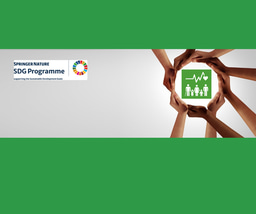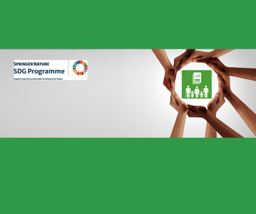World Diabetes Day: Q&A with Prof Orsolya Varga
Published in Public Health


Written by Prof Orsolya Varga, Co-Editor-in-Chief of Journal of Health, Population and Nutrition.
Diabetes and well-being is the theme for World Diabetes Day 2025.
As adults spend a large portion of their lives in workplaces, these settings offer a powerful opportunity to improve diabetes prevention, care, and inclusion. Globally, over 537 million adults live with diabetes (International Diabetes Federation, 2021), with prevalence rising sharply in many regions.
However, accurate data on diabetes epidemiology are often sparse, frequently limited to high-income settings, and rarely reported at the level of specific workplaces or countries. The lack of robust, routine surveillance on diabetes prevalence, incidence, and outcomes in the workplace is a glaring gap in public health. Without reliable data, it is difficult to design targeted interventions or track progress.
Workplace initiatives can make a tangible difference. For example, a large technology employer in Southern California integrated the Diabetes Prevention Program (DPP) into an on-site clinic, improving engagement by bringing preventive services directly to employees (Centers for Disease Control and Prevention, 2024). Similarly, the University of Colorado provided no-cost diabetes supplies and education for staff, reducing absenteeism and improving self-management (University of Colorado Diabetes at Work Initiative, 2023).
At a policy level, the Blueprint for Action on Diabetes in the European Union highlights the workplace as a key setting under its “Reduce the Risk” pillar, advocating for health-enabling environments and early preventive action (MEP Interest Group on Diabetes, 2021).
As the 2025 World Diabetes Day theme, “Diabetes and well-being: Diabetes and the workplace”, reminds us there is an urgent need to strengthen surveillance and research on workplace diabetes prevalence and outcomes, to scale up integrated health programmes that include screening, lifestyle support and flexible scheduling, and to promote stigma-free, inclusive policies that enable employees with diabetes to manage their condition without barriers.
The workplace is more than a site of productivity; it is a crucial arena for well-being. To truly support people living with or at risk of diabetes, we must translate awareness into evidence-driven action where adults spend most of their waking hours.
Journal of Health, Population and Nutrition welcomes submissions on diabetes in relation to population health. Learn more at: https://link.springer.com/journal/41043
References:
International Diabetes Federation. IDF Diabetes Atlas, 10th edition, 2021.
Centers for Disease Control and Prevention. Worksite Diabetes Prevention Program Improves Engagement. Preventing Chronic Disease, 2024.
University of Colorado. Managing Diabetes in the Workplace: Coverage Toolkit, 2023.
MEP Interest Group on Diabetes. Blueprint for Action on Diabetes in the European Union: Reduce the Risk pillar, 2021.
Follow the Topic
-
Journal of Health, Population and Nutrition

This journal brings together research on all aspects of issues related to population, nutrition, and health. The journal publishes articles across a broad range of topics including global health, maternal and child health, nutrition, common illnesses, and determinants of population health.
Related Collections
With Collections, you can get published faster and increase your visibility.
Migration and its effects on maternal and child health and nutrition
International Journal for Equity in Health is hosting a cross-journal Collection in collaboration with the Journal of Health, Population and Nutrition.
This cross-journal Collection is seeking contributions showcasing research on the intersection of migration and maternal and child health and nutrition. Both forced and voluntary migration have become a global phenomenon with profound implications for mothers' and children’s health, nutrition, and overall well-being. This special edition will highlight diverse methodological approaches, including qualitative, quantitative, and mixed-methods studies, that contribute to a deeper understanding of health inequities among migrant populations and offer potential solutions to mitigate them.
This special issue aims to bridge gaps in the evidence base and promote research incorporating diverse disciplinary perspectives and methodological synergies. We welcome theoretical, review, and empirical contributions that enhance our understanding of the complex social, political, economic, and cultural determinants shaping the health of migrant women and children. In addition to the mentioned methodologies, several others can be incorporated to strengthen this research. Participatory and community-based methods, such as participatory action research (PAR), involve affected communities in all stages of the research process, ensuring relevance and applicability. Qualitative and ethnographic approaches, including in-depth interviews and focus groups, provide a deeper understanding of the cultural and social contexts influencing health. Longitudinal studies track health outcomes over time, offering insights into the long-term effects of migration. An intersectional approach considers how multiple identity factors intersect and affect health. Social network analysis explores the role of social connections in accessing healthcare and resources. Policy analysis methods assess how national and international policies impact migrant health, while big data and spatial analysis reveal trends across different regions and contexts. We encourage submissions that engage with affected communities, apply innovative methodological frameworks, and inform policy and practice.
Submissions may include, but are not limited to, the following areas:
Health disparities in migrant populations:
- Examining health inequities affecting migrant mothers and children.
- Identifying key determinants of health disparities in various migration contexts.
Nutritional challenges and interventions:
- Assessing the nutritional status of migrant mothers and children.
- Evaluating policies, interventions, and strategies aimed at addressing nutritional challenges among migrant populations.
Impact of migration policies:
- Analyzing how migration policies influence maternal and child health outcomes.
- Investigating the role of legal frameworks in shaping access to healthcare and nutrition for migrant populations.
Psychosocial well-being:
- Exploring the psychosocial effects of migration on maternal and child health.
- Assessing the role of social support systems in mitigating mental health challenges.
Community health and resilience:
- Investigating community-based approaches to improve the health and resilience of migrant populations.
- Understanding the role of cultural adaptation and integration in health outcomes.
Health systems and access to care:
- Examining how health systems address the needs of migrant mothers and children.
-Identifying innovative approaches to enhance healthcare accessibility and equity for migrant populations.
This Collection supports and amplifies research related to SDG 5, Gender Equality.
This collection is open for submissions from all authors on the condition that the manuscript falls within both the scope of the collection and the journal it is submitted to.
All submissions in this collection undergo the relevant journal’s standard peer review process. Similarly, all manuscripts authored by a Guest Editor(s) will be handled by the Editor-in-Chief of the relevant journal. As an open access publication, participating journals levy an article processing fee (International Journal for Equity in Health, Journal of Health, Population and Nutrition). We recognize that many key stakeholders may not have access to such resources and are committed to supporting participation in this issue wherever resources are a barrier. For more information about what support may be available, please visit OA funding and support, or email OAfundingpolicy@springernature.com or the Editor-in-Chief of the journal where the article is being submitted.
Publishing Model: Open Access
Deadline: Apr 30, 2026
Traditional diets for better health outcomes
Traditional diets have long been recognized for their potential to enhance health outcomes, yet our collective understanding of their impact is still evolving. Advancing research in this area is vital, as it not only contributes to improved public health strategies but also promotes cultural preservation and biodiversity. Recent advances have shed light on the microbiome's interaction with traditional foods, revealing how these diets can reduce the risk of chronic diseases and improve overall well-being. Furthermore, studies have demonstrated the positive correlation between traditional dietary patterns and mental health, emphasizing the holistic benefits they offer. As we look toward the future, continued exploration may unveil new therapeutic applications of traditional foods, innovative preservation methods, and strategies for integrating these diets into modern lifestyles. By fostering an interdisciplinary approach, we can unlock the potential of traditional diets to address contemporary health challenges and create sustainable solutions for a healthier global population.
Topics of interest include but are not limited to:
- Nutritional benefits of traditional diets
- Cultural implications of dietary practices
- Traditional foods and chronic disease prevention
- The role of biodiversity in nutrition
- Food security and traditional agricultural practices
- Integrating traditional diets into modern health frameworks
- The impact of traditional diets on mental well-being
- Case studies on successful traditional dietary interventions
All submissions in this collection undergo the journal’s standard peer review process. Similarly, all manuscripts authored by a Guest Editor(s) will be handled by the Editor-in-Chief. As an open access publication, this journal levies an article processing fee (details here). We recognize that many key stakeholders may not have access to such resources and are committed to supporting participation in this issue wherever resources are a barrier. For more information about what support may be available, please visit OA funding and support, or email OAfundingpolicy@springernature.com or the Editor-in-Chief.
Publishing Model: Open Access
Deadline: Jul 31, 2026




Please sign in or register for FREE
If you are a registered user on Research Communities by Springer Nature, please sign in